Urban & Community Forestry
Investing from the Ground Up
in Resilient Communities and Trees
What is the Urban and Community Forestry (UCF) Program?
Over 90 percent of our region’s population lives in urban communities. Many urban communities depend on trees but are unaware of a tree’s economic, environmental, and social services. Urban trees along streets, backyards, parks, greenways, and gardens offer a wealth of services like enhancing public health and quality of life; sequestering carbon; providing habitat for wildlife, and cleaning the water we drink and air we breathe, to name a few.
To foster these tree benefits and services in all communities, the Urban and Community Forestry Program collaborates with partners, investing in the planning, planting, and maintaining city trees and forests. Additionally, the program supports developing educational programs, outreach products, management tools, and training to empower communities to branch out and steward their urban and community forests.
Our Work
In California, Hawaiʻi, and the United States Affiliated Pacific Islands, the Urban and Community Forestry Program supports the planning and management of healthy trees and resilient communities.
-
HOW ARBORISTS GO BEYOND JUST PLANTING TREES
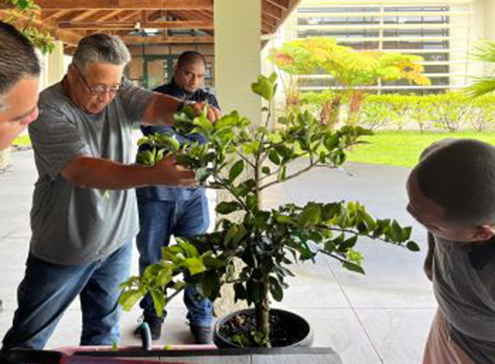
Arborists often play a hidden but vibrant role in community building and resilience.
-
HAWAII'S URBAN TREE
CANOPY
The canopy viewer aims to build upon our previous understanding of tree canopy in Hawaiʻi by determining its location, distribution, and equitable access. This tool can help a community design and implement sound management practices to maximize nature's benefits.
-
CALIFORNIA'S URBAN TREE CANOPY

California’s urban tree canopy covers 19% of the state's urban areas. Our map viewer highlights population and environmental characteristics that may identify communities disproportionately burdened by risks that urban tree cover may help ameliorate.
-
UTILIZING URBAN FORESTRY RESEARCH TO CULTIVATE A SUSTAINABLE FUTURE
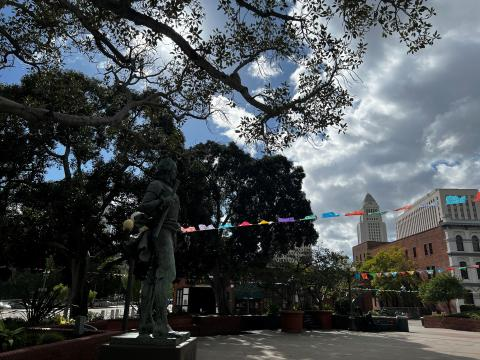
This February 2024 issue of the Pacific Southwest Research Station's Forest Explorer Newsletter features ongoing urban research on tree management in public schools, the relationship between wildfire, urban areas, and vegetation, and fire risk and urban expansion in Hawaiʻi.
-
TREETOPIA FESTIVAL BRINGS COMMUNITY TOGETHER FOR FUN WITH TREES
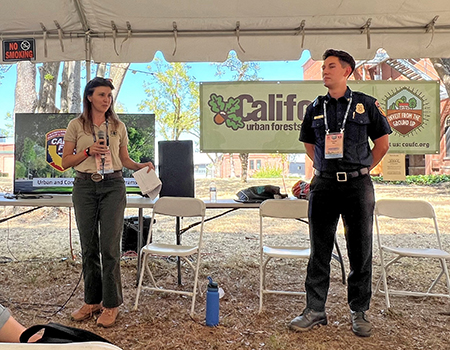
Urban and community forests benefit everyone. And don’t think they are just about planting trees. It’s about giving communities a connection with the outdoors.
-
URBAN FORESTRY: FROM REDLINING TO GREEN LINING
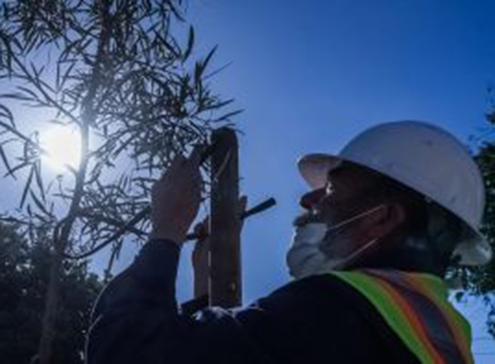
Communities across the country are rethinking urban planning and what a greener, cooler cityscape might mean for residents.
- One Path to the Forest Service — From Brazil to Hawaiʻi and Beyond
- Jennipher Himmelmann, resource assistant at the Institute of Pacific Island Forestry, shares her career path journey.
- Who Are the People in Your National Forests — Intern to ORISE Fellow
- Meet Michelle Carr, who works for the Pacific Southwest Research Station, and her passion for community engagement.
- Race to Preserve Hawaiian Nēnē and Native Dry Forest
- Events like the Run for the Dry Forest provide important conservation education and resources that protect native species like the Hawaiian Nēnē, the world's rarest goose.
- Treetopia Festival Brings Community Together For Fun With Trees
- Urban and community forests benefit everyone. And don’t think they are just about planting trees. It’s about giving communities a connection with the outdoors.
- City Leaves: The Benefits of Urban Forests
- The past eight years were the warmest on record. It’s a trend more noticeable in larger cities, where forest floors and lush green canopies have been replaced by pavement and roofing.
- The Grassroots of Our Urban Forests
- Imagine your neighborhood... whether a big or small town. The trees, vegetation and green spaces are likely a part of the picture. But they probably aren't the focus.
- From Gray to Green: Serving CA Urban Spaces with More Forest Canopy
- Learn how our partners are bringing more nature into the city and inspiring the next generation to help urban communities.
- From Gray to Green: Growing Engagement Roots into the Future
- After three years of meeting virtually, the Los Angeles Urban Center for Natural Resources Sustainability (LA Urban Center) and its partners convened for the Annual Partners Meeting themed “From Gray to Green: Growing Engagement Roots into the Future.".
- Harmonizing Hawaii's Forests
- The feel of the forest came to the stage thanks to musicians, animators, foresters, educators and cultural practitioners, creating Symphony of the Hawaiʻi Forests.
- Partnerships: Planting Trees, Restoring Struggling Ecosystems
- Anahuacalmecac International University Preparatory of North America, Los Angeles County’s only indigenous TK-12 school, hosted a community reforestation event at Debs Regional Park in partnership with CAL FIRE and Region 5's UCF Program.
- Climbing to New Partner Heights: Vegetation Training in the Federated States of Micronesia (FSM)
- Region 5 UCF Program funded a two-week intensive technical training, empowering local communities to remove and manage vegetation at Nan Madol, a UNESCO World Heritage Site in FSM.
- Art Meets Climate Change in Downtown LA
- During the last few months of 2022, an art exhibit deepened discussions about climate change in Los Angeles through a partnership between Avenue 50 Studio and Region 5 UCF Program.
- Urban Forests: Health, Wealth and Resilience
- An Interview with Miranda Hutten, Program Manager for the Urban and Community Forest Program in Region 5.
- Urban Meets Wild Trail
- Region 5 UCF Program designed the “Urban Meets Wild Trail,” an interactive experience at the America’s Great Outdoors site at the Los Angeles County Fair.
Partners
By partnering with states, cities, communities and nonprofit organizations, we can improve forest management, share information, develop tools, and restore our community trees and forests. These resources are vital to tackling the challenges facing all trees and communities, whether it be drought, invasive pests, equitable access, a changing climate, workforce capacity, or risk management.
State Partner Links
USDA Forest Service Partner Links
Resources
To keep you in the know, here are some resources about:
- USDA Press Release
- On September 14, 2023, Agriculture Secretary Tom Vilsack announced the U.S. Department of Agriculture’s Forest Service is awarding more than $1 billion in competitive grants to plant and maintain trees, combat extreme heat and climate change, and improve access to nature in cities, towns, and suburbs—made possible by President Biden’s Inflation Reduction Act (IRA).
- IRA UCF 2023 Awards List
- The Forest Service selected 385 grant proposals from entities in all 50 states, two U.S. territories, three U.S. affiliated Pacific islands, and several Tribes working to increase equitable access to trees and nature, and the benefits they provide for cooling city streets, improving air quality, and promoting food security, public health, and safety.
- Hawaiʻi UCF State Program IRA Funding Opportunity - Closed - Congratulations to the selected awardees!
- California UCF State Program IRA Funding Opportunity - Applications open until May 30, 2024
- CAL FIRE, California’s state forestry agency, released their 2024 IRA Grant Guidelines and applicants can now submit proposals through CAL FIRE's online application portal. With a total $30.8 million available, eligible project types include urban forest expansion, improvement, and management, education and workforce development, equity and capacity building, and green schoolyards. Applicant eligibility also varies by grant type and can include California cities, counties, qualifying districts, Federally Recognized Tribal Nations, and/or non-profit organizations. To receive updates about this funding opportunity's online workshops, office hours, and more in your inbox, please consider subscribing to CAL FIRE’s Grant Updates listserv.
Legislation and Executive Orders
- Cooperative Forestry Assistance Act of 1978 (Section 1D)
- Section 1D, the Urban and community forestry assistance Section of the Cooperative Forestry Assistance Act of 1978, details the federal mandate of the urban and community forestry program.
- Justice40 Initiative
- Under Executive Order 14008, this initiative is named after the goal that 40% of the overall benefits of certain Federal investments will go to disadvantaged communities negatively impacted by pollution.
Reporting Tools
- National Information Center (NIC) Portal
- Through the NIC Portal, users can access web-based application systems that collect grant information for the USDA Forest Service State and Private UCF program.
- Community Accomplishments Reporting System (CARS) User Guide
- A USDS Forest Service Guide to CARS, a web-based tool used to report annual accomplishments of the UCF program, including those of its grantees.
- SAM.gov
- An official website of the United States Government used to manage federal funding contracts.
Grant Opportunities
- Grants.gov
- Run by the Office of Management and Budget (OPM), the site is a centralized location for federal funding opportunities.
- USDA Forest Service & National Association of State Foresters (NASF) State Urban Forest Resilience (SUFR) Grant Portal
- Application Portal for the SUFR Grant Program, which puts out requests for proposals annually as hosted by the USDA Forest Service and the NASF.
- CAL FIRE UCF Grant Programs
- Information about CAL FIRE UCF’s grant programs and resources for grant applications.
- Kaulunani Grant Program
- Information about Hawaii's Kaulunani grants programs and resources for grant applications.
- National Urban and Community Forestry Advisory Council (NUCFAC) Grant Projects
- A database of completed research and technology projects recommended by the NUCFAC for USDA Forest Service funding since 1993.
Guides
- USDA Forest Service Partnerships Funding Information
- Information and resources about grant funding for USDA Forest Service partners.
- Urban Forestry Funding Action Guide
- Region 5 State & Private Forestry Funding Resources
- Vibrant Cities Lab
- Founded in partnership between the USDA Forest Service, American Forests and the National Association of Regional Councils (NARC), Vibrant Cities Lab hosts research syntheses, case studies, and toolkits to guide city managers, policymakers and advocates build resilient urban forest programs.
- California Urban Forests Council
- Through education and outreach, community-based activities, and collaborative action, the Council promotes smart investment in green infrastructure for California communities.
- California ReLeaf
- California ReLeaf supports grassroots efforts and builds strategic partnerships across the state to protect, enhance, and grow urban and community forests.
- Western Chapter of the International Society of Arboriculture (ISA)
- Western Chapter of the ISA is a non-profit corporation that aims to promote research and education to advance the professional practice of arboriculture Arizona, California, Hawaiʻi, and Nevada.
- City Plants
- A non-profit organization running a public-private partnership between the City of Los Angeles and six other non-profit organizations, City Plants engages Angelenos by coordinating tree planting and care throughout the city.
- Pacific Islands Forestry Committee (PIFC), Western Forestry Leadership Coalition
- Comprised of forestry leaders from the United States Affiliated Pacific Islands and the USDA Forest Service’s Institute of Pacific Islands Forestry and Pacific Southwest Region, the PIFC aids the Council of Western State Foresters in developing an informed and unified approach to meet the needs of tropical forest management in the Pacific.
- Kupu
- Honolulu-based 501(c)3 non-profit Kupu, which means “to sprout” or “to grow” in Hawaiian, has a two-fold mission: to preserve the land while empowering youth by creating green internships and service-learning opportunities across Hawaiʻi and the Pacific region.
- Smart Trees Pacific
- Originally founded as “Friends of Hawaii's Urban Forests,” Smart Trees Pacific is a 501(c)3 non-profit that seeks opportunities to increase the collective understanding, establishment, and maintenance of the urban forest across the Pacific.
- Ebiil Society
- A Palau-based non-profit, Ebiil Society focuses on the education of environmental protection and proper management of natural resources through indigenous knowledge.
- Urban Forest Ecosystems Institute (UFEI) at California Polytechnic State University, San Luis Obispo
- UFEI was developed by the Natural Resources Management & Environmental Sciences (NRES) Department faculty to address the increasing need for improved management of the urban forests in California. The institute provides applied research, extension and technology transfer, and community service and outreach. UFEI has developed several guides and tools to support urban forestry management, including SelecTree, Urban Tree Key, California Urban Tree Inventory, Urban Tree Detector, and Pacific Island Trees tool.
- Urban Tree Monitoring Training YouTube Video Series
- This five-part animated series, created by the USDA Forest Service, provides a broad overview to help viewers begin to undertake urban tree monitoring projects.
- Urban Forest Connections Webinar Series
- Hosted by the USDA Forest Service National Urban Forest Technology and Science Delivery Team since 2020, these themed webinar series discuss the latest science, practice, and policy on urban forestry and the environment.
- Watering Young Trees YouTube Video
- Watering Mature Tree YouTube Video
- Beyond Trees Network YouTube Channel
- Hosted by USDA Forest Service International Programs, Beyond Trees is a global network of urban conservation organizations and NGOs who, through education and outreach, aim to increase the living conditions in urban areas.
- Los Angeles Center for Urban Natural Resources and Sustainability Fellowships
- Through its annual Science Fellowship Program, the Center supports and showcases graduate-level research that advances urban natural resource sustainability in the Southern California region.
- California Urban Wood Academy Virtual Workshop - Available until December 2024
- Developed through a collaboration between the USDA Forest Service and CAL FIRE, this virtual Urban Wood Academy is designed to expand knowledge and engagement in the growth of urban wood utilization. It is a self-paced, 6-hour workshop that grants 5.5 ISA CEUs and SAF CFEs upon completion, as well as a strong foundation on urban wood utilization topics for incorporating urban wood into the full life cycle and planning phases of a long-term forest management action plan in your city or community.
- Urban Tree Monitoring: A Resource Guide
- Published by the USDA Forest Service Northern Research Station, this report provides in-depth guidance for urban forest managers and researchers who want to design and implement a tree monitoring project.
- Urban Tree Monitoring: A Field Guide
- A companion document to the Urban Tree Monitoring: A Resource Guide, this report provides detailed protocols for urban tree monitoring data collection, intended as a guide for urban forest managers, researchers, and citizens scientists.
- "A Tree Can Be" Marketing Toolkit
- To help share and educate the benefits of trees to all, this Arbor Day Foundation toolkit provides customizable and printable door hangers, yard signs, and flyers as well as social media images and messaging in English and Spanish.
- Stewardship Mapping and Assessment Project (STEW-MAP)
- As an empirical study of a city or region and a publicly available online database, STEW-MAP seeks to answer where, why, and how environmental stewardship groups are caring for our urbanized landscapes.
- Tree Equity Score
- A web-based application that calculates scores based on how much tree canopy and surface temperature align with income, employment, race, age and health factors across the nation.
- iTree
- A collection of free tools assessing individual trees and tree canopies developed in partnership by public and private government, business, and professional organizations.
- Heat.Gov
- Web portal for the National Integrated Heat Health Information System (NIHHIS) to help reduce the health, economic, and infrastructural impacts of extreme heat.
- SelecTree
- A tree selection guide hosted by the Urban Forest Ecosystems Institute at California Polytechnic State University.
- University of California Master Gardener Program
- This program’s site, which is a public service and outreach program under the University of California Agriculture and Natural Resources, hosts California gardening resources and information about local involvement.
- University of Hawaiʻi Master Gardener Program
- This program’s site, which falls under the University’s College of Tropical Agriculture and Human Resources (CTAHR), hosts a range of resources about tropical horticulture in Hawaiʻi.
- Ten-Year Urban Forestry Action Plan and Five-Year Benchmark Accomplishment Report
- Hawaiʻi Urban and Community Forestry Resources (Kaulunani)
- This collection of links, put together by the state of Hawaii's UCF program, includes content about invasive species, health and tree peer-reviewed articles, partner organizations and more.
- Urban Wood Partner Empowerment Package Toolkit
- The Urban Wood Economy, Inc and #forestproud created this portfolio of digital assets to help promote and showcase urban and community wood to new audiences. The toolkit includes 2 promotional films, social media content, blogs, partner interviews, and a list of available resources covering urban wood—all free and available for use.
- Adapting to Urban Heat: A Tool Kit for Local Governments
- This toolkit provides local governments with some guidelines and decision-making framework for reducing the effects of increased heat in urban communities, exploring built-environment changes like cool roofs, green roofs, cool pavements, and urban tree planting.
- Plant Pono
- Developed in partnership with Hawaiʻi Invasive Species Council, Coordinating Group on Alien Pest Species (CGAPS), and the Hawai‘i Biological Information Network, this online resource features a searchable database of plant species, including the likelihood of invasiveness in Hawaiʻi using the Hawaiʻi Weed Risk Assessment System.
- Pacific Island Climate Adaptation Science Center (PI-CASC) - Climate Resources
- Compiled by PI-CASC for those in Hawaiʻi and the Pacific Islands, this list of climate resources includes climate assessments, adaptation tools, education, and outreach resources.
- Tree Identification Tools List (iTree)
- Tree Health Metrics: A Brief Field Guide (The Nature Conservancy and USDA Forest Service)
- Resources Related to Tree Planting (California ReLeaf)
- Tree Planting Guide (Vibrant Cities Lab)
- Climate and Health Action Guide (Vibrant Cities Lab)
- Trees and Drought Resources (California Urban Forests Council)
- California Tree and Drought Resources (Save Our Water)
- Resources for Educators about Arbor Week (California ReLeaf)
- Tree Owner's Manual (USDA Forest Service)
Pacific Southwest Region Urban and Community Forestry Webinar Series
Hosted by the Pacific Southwest Region State and Private Forestry and the Pacific Southwest Research Station, these monthly webinars are an opportunity for folks to learn about urban and community forestry projects across Hawaiʻi and the U.S.-Affiliated Pacific Islands from a local community leader.
March 7
Amy B H Greenwell Ethnobotanical Garden
Noa Lincoln, Vice President
Situated South of Kailua-Kona, along Hawaiʻi Island’s west coast, Amy B H Greenwell Ethnobotanical Garden's 15-acre site is the only federally-designated Community Forest and a model for traditional Hawaiian cultural land use. The garden’s mission is to conserve culturally significant plant resources and contains over 200 native plant species, many of which are rare and endangered. Learn more about the history, research, and future actions of the Garden to increase resilience to climate change through the development of a Community Forest Plan.
Webinar Recording | PowerPoint Presentation
April 3
Mālama Learning Center: Urban 'Āina
Pauline Sato, Executive Director
Mālama Learning Center is a nonprofit organization based out of Oʻahu, Hawaiʻi, built upon a concept of bringing the forest to the cities is working to serve West O‘ahu communities by providing Hawai‘i students with place-based, hands-on learning opportunities. Learn more about how they inspire the next generation of land stewards and bring together art, history, science, community, and culture to promote sustainability in Hawaiʻi.
Webinar Recording | PowerPoint Presentation
May 2
Parks For People, Trust for Public Land Hawaiʻi
Emily Perry, Program Manager
Trust for Public Lands (TPL) is a nonprofit organization working across the country to provide benefits to communities in schoolyards, national parks, and public lands while connecting people to the outdoors. Specifically, in Hawai‘i, the organization works closely with communities and focuses on areas where parks and public lands are needed most. Their programs have protected and preserved native forests, drinking water sources, natural resources, and hiking trails, as well as prevented development on culturally significant areas resulting in permanent land protection.
This month’s webinar we learned about the organization’s Parks for People Program, a pilot project at ʻAʻala Park, Oʻahu that underwent a lot of planning and community engagement to implement major restoration work that will revitalize the park and increase community interest in urban green spaces. As well as the successful partnerships with neighboring banks and City’s Parks Department to ensure tree maintenance and survival.
June 26
Smart Trees Pacific
Wai Lee, Executive Director
Jolie Dollar, Project Consultant
July 18
Ebiil Society, Palau
Ann Singeo, Executive Director
August 8
Nan Madol, Pohnpei
Kevin Eckert, Arbor Global President
Contact Us
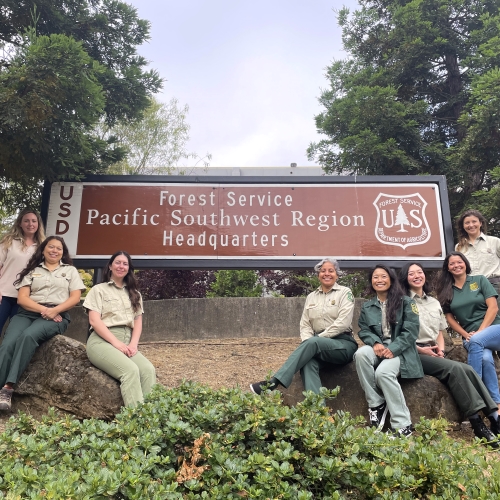
| Miranda Hutten | Program Manager | (707) 515-5408 |
| Alicia Sanchez Scott | Assistant Program Manager | (805) 450-8369 |
| Laura Wolf | Assistant Program Manager | (720) 830-6407 |
| Pauline Ordonez | Program Specialist | (661) 481-1083 |
| Michelle Carr | Acting Program Specialist | |
| Kathryn Williams | Grant Management Specialist | (707) 980-3927 |
| Jennipher Himmelmann | Resource Assistant | (808) 557-5590 |
| Chanel Yee | Resource Assistant |

